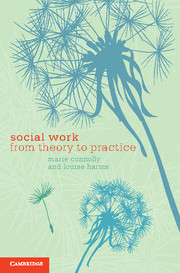Book contents
- Frontmatter
- Contents
- List of figures
- Preface
- Acknowledgements
- 1 Social work knowledge, theory and practice
- 2 Frameworks, models and practice
- 3 Ecosystems theories
- 4 Onion-peeling theories
- 5 Faulty-engine theories
- 6 Story-Telling Theories
- 7 Mountain-moving theories
- 8 Reflective practice and theory
- Concluding thoughts
- References
- Index
- References
1 - Social work knowledge, theory and practice
- Frontmatter
- Contents
- List of figures
- Preface
- Acknowledgements
- 1 Social work knowledge, theory and practice
- 2 Frameworks, models and practice
- 3 Ecosystems theories
- 4 Onion-peeling theories
- 5 Faulty-engine theories
- 6 Story-Telling Theories
- 7 Mountain-moving theories
- 8 Reflective practice and theory
- Concluding thoughts
- References
- Index
- References
Summary
SOCIAL WORKERS practise across a wide range of settings with all kinds of different people. Some work primarily with individuals whereas others work with families or groups of people in therapeutic or community contexts. Some social workers focus on community advocacy, community action and social change. In such diverse disciplinary contexts, the notion of theoretically informed practice can seem complicated. Yet social workers do draw upon a range of theoretical perspectives in their work, using theory to help understand and make sense of what is in reality a complex human world. Many theories used by social workers can also be found influencing the practices of allied professionals: counsellors, psychologists and others working within the human services. Theories explored in this book are not the sole purview of the social work profession, nor can they be claimed as necessarily emerging from within a social work paradigm. Professional interpretations of knowledge and theory overlap and interweave (Trevithick 2005). We would nevertheless argue that theory applied in social work has a disciplinary character that distinguishes it from the application of the same theories across allied disciplines. This is because knowledge and theory in practice is critically influenced by disciplinary attachments and the underpinning values and nature of the profession itself.
SOCIAL WORK'S INTERPRETATIVE LENS
In the following chapters we explore a range of practice theories that have been influential in social work. First, however, we will tease out the disciplinary nature of social work's interpretative lens, to see how it influences the application of knowledge and theory, what we understand theory to be, and how contemporary debates have influenced the application of theory over time. We propose that the social work interpretative lens is enriched by four additional lenses that together influence the way in which we apply theory in practice: the relational lens; the social justice lens; the reflective lens; and the lens of change.
- Type
- Chapter
- Information
- Social WorkFrom Theory to Practice, pp. 1 - 23Publisher: Cambridge University PressPrint publication year: 2011



